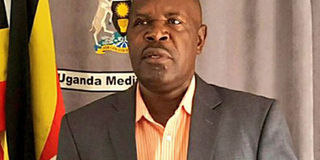Cabinet approves the creation of Kiswahili Council

Mr Ofwono Opondo, the executive director of Uganda Media Centre
Government has endorsed the establishment of the Uganda National Kiswahili Council whose main objective is to guide the introduction of Swahili as the second national (official) language.
Addressing journalists about the Cabinet decision at State House Entebbe on Monday, Mr Ofwono Opondo, the executive director of Uganda Media Centre, said that the establishment of the council is provided for in the Constitution and it’s mandated to ensure that Swahili is rooted as the second national language.
“The Constitution provides that we shall have two national languages [that is ] English and Swahili but we have not been using Swahili. This council will be recruiting Swahili teachers who will be deployed to teach Swahili in schools,” he said.
He said that the council will also oversee the establishment of a policy, legal and institutional framework for setting standards for effective promotion, development and usage of Kiswahili at all levels.
Mr Opondo said that the council will also be responsible for the harmonisation, coordination and collaboration among ministries, departments and agencies to ensure that Kiswahili use, promotion and development which will enhance the provision of Kiswahili services and resources.
English has been Uganda's lone official language since independence in 1962.
In 2005 Swahili, which is foreign and viewed as being neutral, was proposed as the country's second official language.
But this is yet to be ratified by Parliament, making Luganda and Swahili languages being used for inter-ethnic communication.
Mr Opondo who read the resolutions on behalf of the Information Minister, Mr Frank Tumwebaze, said that Cabinet decided that a Memorandum of Understanding between Kenyan and Ugandan presidents for sustainable peace and development among the Turkana, Pokot and Karamojong, would be signed be on Wednesday in Moroto town.
Other resolution that were passed by Cabinet, according to Mr Opondo are among others; harnessing the tourism potential, promotion of science, technology engineering and innovation, mineral beneficiation and oil refining as well as revisiting the role of government in doing business in strategic areas of the economy.



